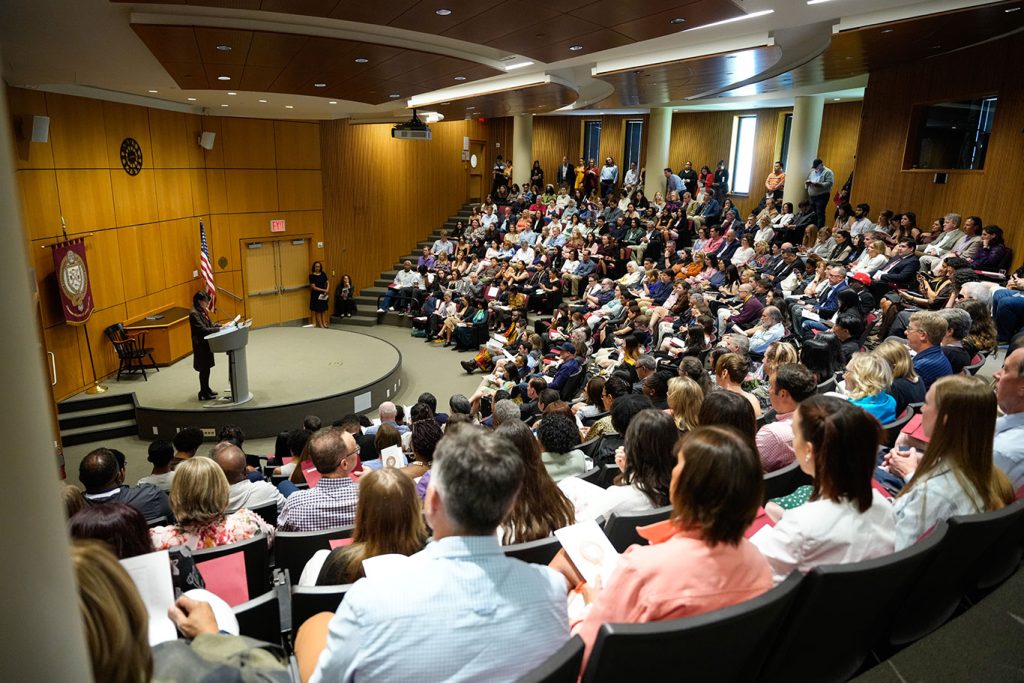
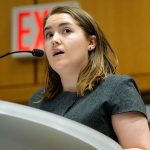
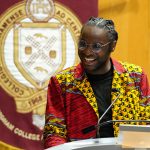
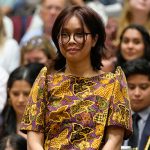
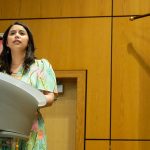
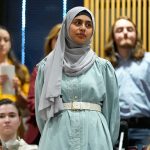

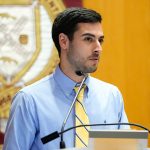
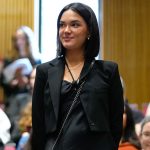
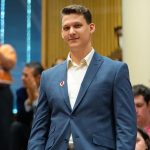
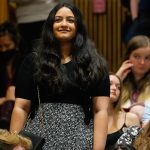 They might be too modest to celebrate themselves, but on May 20 at a ceremony at McNally Amphitheatre, Fordham College at Lincoln Center (FCLC) students were tasked with doing just that–and with lifting each other up as well.
They might be too modest to celebrate themselves, but on May 20 at a ceremony at McNally Amphitheatre, Fordham College at Lincoln Center (FCLC) students were tasked with doing just that–and with lifting each other up as well.
At the ceremony, the second of its kind since debuting last year, awards were given to honors students who’d completed a senior thesis, won prestigious fellowships, and been admitted to academic societies such as Phi Beta Kappa.
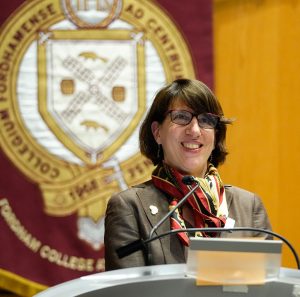
In her remarks, FCLC Dean Laura Aurrichio, Ph.D., noted that like them, she arrived in August 2019. And like them, it took her a while to get used to her new surroundings. By spring 2020, she felt truly ready to pull up her sleeves and get to work on long-term projects.
“Of course, the universe had other plans,” she said, noting that the pandemic and the murder of George Floyd made for stressful times. Nevertheless, students persevered.
“You might be too modest to celebrate yourselves, but I also know that you are all too kind, too supportive, and too community-focused not to celebrate your classmates.”
Awards were also given to students who excelled in disciplines ranging from the arts and sciences to the social sciences and the humanities–and student speakers from each field got up to speak.
‘Soul-shimmering’ clarity
Anna Nowalk, a theology/music double major who was admitted to the Phi Beta Kappa honors society, spoke about the humanities.
“Throughout my time at Fordham, I’ve brushed against potentially life-altering understandings of the Christian mission and have on occasion felt my soul shimmer as I saw with clarity for a moment how I might be called to it,” she said.
Fordham Theatre Student Honored with Alumni Chair
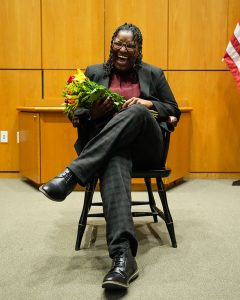
Amara McNeil, an acting major and a founder of the BIPOC Theatre Alliance of Fordham, was honored with the FCLC Alumni Chair Award. Aurrichio expressed personal gratitude to McNeil for joining the inaugural cohort of the FCLC Student Advisory Group.
“I really just cannot say enough about how grateful I am to her for all the work that she has done and for her work in leaving this place much better than she found it,” she said.
Trystan Edwards, a theater and African and African American studies double major, implored his fellow graduates in his keynote address to live in what he called “the gray” areas of life.
“I was ready to set my future ablaze with fiery reds and opulent oranges, and I was ready to seize every opportunity and take the city by storm,” he said of his move to Manhattan.
When the pandemic interrupted everything in 2020, the gray returned, and it was here that Edwards discovered resilience.
“As we accept our awards tonight and our diplomas tomorrow beautifully bedecked in our rosy reds, bright blues, gorgeous greens, and yappy yellows, remember to leave room for the gray,” he said.
“It is the land of all possibilities, truth, and humanity.”
]]>
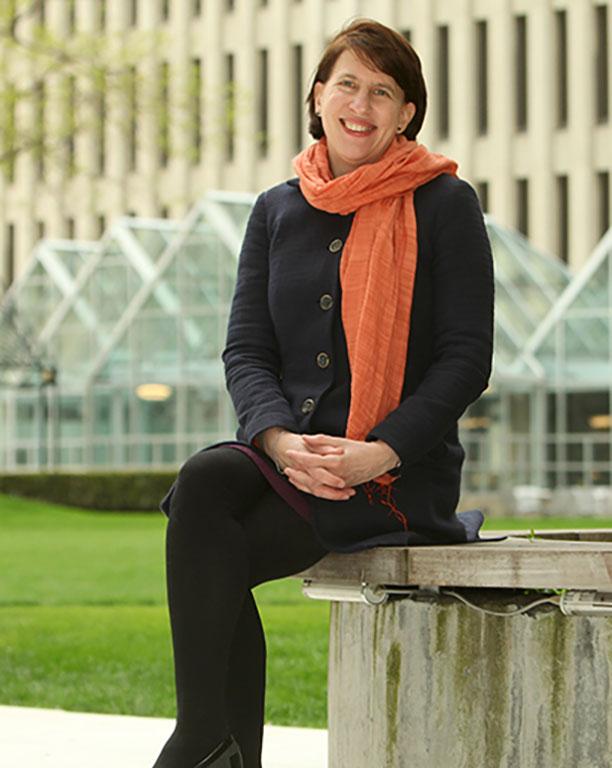
That started with an Instagram post from her personal account every day of her first month on the job, followed by the creation of a weekly newsletter from the dean that is sent to every FCLC student. This year, she reconvened the Fordham College at Lincoln Center Student Advisory Group, a group of students representing different class years, genders, majors, and geographical backgrounds.
The group, which has 15 members, has met three times this year over Zoom and in-person and will meet once more over Zoom this semester.
Auricchio said the impetus for restarting the group, a form of which also exists at Fordham College at Rose Hill and the Gabelli School of Business, was simple.
“I decided that what I really needed was to have some way for students to raise their concerns to me and give me a sense of what’s going on the ground, so I can better serve them,” she said, noting that her Instagram account and newsletter have been well-received by students, but they’re both one-way channels.
“One of my goals is to empower students so they have will have a better understanding of how they can find the information they want.”
The inaugural meeting was an introduction to the group, and the second one was a joint meeting with the members of another newly revived advisory group comprised of alumni.
A third meeting was held in late February, where students listened to members of the Fordham faculty and administration describe what shared governance means to them. In higher education, the concept of governance refers to structures and processes through which faculty, staff, administration, governing boards, and students participate in the development of policies and in decision-making.
For that meeting, the group was joined by Andrew Albin, Ph.D., an associate professor of English and medieval studies who represents FCLC in the University’s faculty senate; Jenifer Campbell, Ph.D., dean of students at Lincoln Center; Andrew Clark, Ph.D., a professor of French and comparative literature who represents the department of modern languages and literature in the FCLC’s College Council; Jonathan Crystal, Ph.D., vice provost; Gene Fein, Ph.D., assistant vice president for academic records and services; and Robert Moniot, Ph.D., associate dean at Fordham College at Lincoln Center.
The format of the meetings is still in the beginning stages, but Auricchio said she expects the agendas will be determined in tandem with the students, who were selected from an open call that went to students in the early fall.
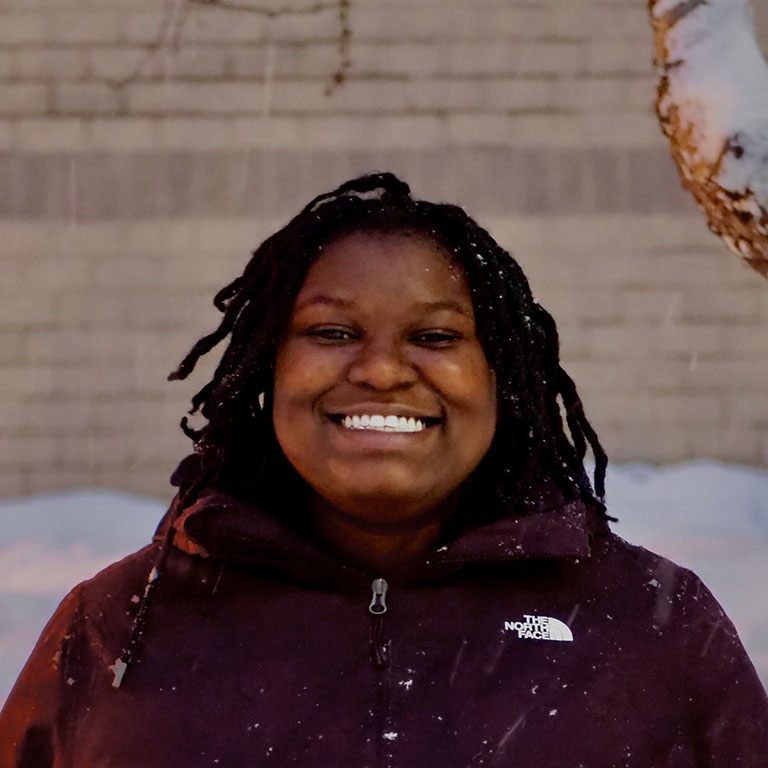
She said that she’s learned from the meetings that students have a great deal of healthy curiosity about decisions that are made on both the FCLC level and the University level.
“It’s become really evident to me that a lot of it is opaque, not because we intentionally make it opaque, but because just because it’s a large, complex bureaucracy. Any university is a large, complex machine,” she said.
“Students who want to understand how they can make an impact on the machine don’t know where the levers are.”
Amara McNeil would certainly count herself among those looking for levers to pull. A junior majoring in lighting design in Fordham Theatre’s design and production track, McNeil co-chairs the Black, Indigenous, and People of Color (BIPOC) Theatre Alliance of Fordham. McNeil had approached Auricchio in 2020 with concerns about her program, so when Auricchio told her about the new advisory council, she eagerly joined.
“I feel like there’s a lot more decision-making that happens under Fordham’s hood that should be transparent to students,” she said, adding that she loves being part of the group.
“I like that it’s comprised of students from all different years’ majors, residents, and commuters.”
The first meetings have brought forth questions revolving around issues such as the University’s endowment and how University leadership is chosen, McNeil said, noting that she hopes future meetings will address some of those questions.
After this month’s meeting, she said shared governance is a good example of an issue that could use more attention.
“It seems like we’re doing better than a lot of universities, and that’s something I hear a lot at Fordham, especially in the theater program,” she said.
“But that doesn’t mean we can’t improve, and we can’t be the best at something. That’s always the goal.”
Students who are interested in joining the advisory group next year are encouraged to e-mail [email protected].
]]>